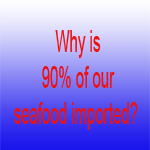
 |
 |
| The Philadelphia Inquirer, 14 August,
1998, Op-Ed Page
At Jack's Firehouse restaurant in Fairmount, they serve their firm, succulent swordfish steaks with mango rum sauce -- and a big dollop of political incorrectness. Proprietor Jack McDavid is perhaps the nation's most outspoken opponent of an effort underway by an organization called SeaWeb, funded by the Pew Charitable Trusts, to get chefs to drop swordfish from their menus. "I saw it coming," he says of the "Give the Swordfish a Break!" campaign. "In fact, I smelled it coming . . . and it smelled fishy." He contends that the campaign won't save any swordfish and could hurt his friends, "the boys who bring in the fish." Says Rebecca Rimel, president of Pew, whose offices are a few blocks south of McDavid's restaurant: "I understand his point." But from her perspective, the campaign is the best way to get the American public -- in what seems to be the throes of a massive attack of attention deficit disorder -- to focus at least briefly on the problem of overfishing in the North Atlantic. She hopes to raise consciousness about a whole array of problems facing the oceans; swordfish seemed like the best place to start. The contretemps between the little restaurateur and the big foundation
exemplifies the classic dilemma in many environmental debates: the choice
between saving jobs and preserving natural resources.
While McDavid can't match the scale of Pew's multimillion-dollar largesse
for education, the arts, faith-based institu-tions and other good causes,
he does what he can "for just about every charity that comes along," including
farmland preservation and preparing meals for the homebound elderly.
McDavid's case for serving swordfish starts with the fact that American fishermen already have curtailed their catch of swordfish by 30 percent in the last several years to conform with quotas set by an international organization. An accountant by training, McDavid calculates that reducing demand for swordfish caught by Americans will simply mean that more swordfish will be caught by countries that don't adhere to the agreement. And those fishermen often ship their catches to the United States. "That means you'll be punishing the people who are playing by the rules and rewarding those who don't," he says in his soft drawl. "And that's un-American." In particular, he doesn't want to see his friends down at Barnegat Light fishery -- the ones who make sure he gets the freshest fish in the catch -- get hurt. Life is tough enough for them as they go out on voyages such as the one detailed in the best-seller The Perfect Storm by Sebastian Junger, which combines the elemental danger of an Everest ascent with the financial risk of a trip to Vegas. Rimel exudes her own brand of fireproof Southern charm as she responds that the current limits are not enough to allow the overfished stocks of swordfish -- as well as other fish -- to rebuild. While this may mean some short-term economic discomfort for fishermen, replenishing the stocks will eventually benefit them (along with everyone else). It is simply not true, she and SeaWeb argue, that every swordfish not caught by U.S. fishermen will be caught by fish-ermen of other nations. Moreover, the United States can do a lot on its own to reduce fishing in breeding grounds in American waters that results in the needless slaughter of swordfish before they're mature enough to breed. McDavid and Rimel (and just about everyone else) agree that there must be more effective international cooperation, but they differ on how to accomplish that. SeaWeb says that the United States must "lead by example" and that increased
public awareness is needed to stiffen the resolve of the U.S. delegation
that will negotiate new limits this fall.
"Right away," McDavid predicts, "you'd have them saying, 'How many fish did you say we could catch, sir?' " There is perhaps one more point I should make about the swordfish served
at Jack's Firehouse.
David Boldt's column appears on Tuesdays and Fridays. ©1998 Philadelphia Newspapers Inc. |